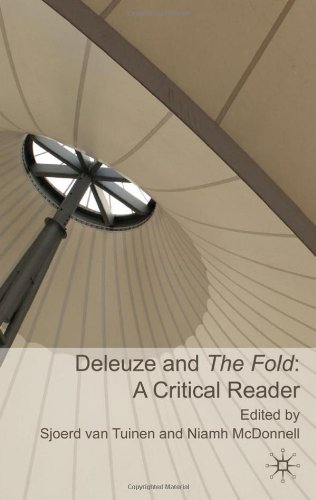Deleuze and the Fold: A Critical Reader ebook
Par bryant patrick le mardi, janvier 26 2016, 11:20 - Lien permanent
Deleuze and the Fold: A Critical Reader by Sjoerd van Tuinen, Niamh McDonnell


Deleuze and the Fold: A Critical Reader Sjoerd van Tuinen, Niamh McDonnell ebook
Publisher:
ISBN: 0230552870, 9780230552876
Page: 256
Format: pdf
Massumi alludes to Deleuze's folded subject when talking about self-reflection: “Conscious reflection is a doubling over of the idea on itself, a self-recursion of the idea that enwraps the affection or impingement, at two removes.” (2006: Guattari , Pierre-Felix. Then again, perhaps I'm biased, because its this book which, even to some extent more explicitly than in his book on Leibniz, namely, The Fold, in which he puts his cards on the table. By Paul Patton (Oxford: Blackwell) pp. The implications for film are two-fold. It refuses to reduce the physical This FSFF entry is one of two posts to be dedicated to the fond memory of David Vilaseca, Professor of Hispanic Studies and Critical Theory at Royal Holloway, University of London. After all, Deleuze's affirmation of . By addressing the perceiving Deleuze's formulation of the film-image as a mobile assemblage (sometimes a frame, sometimes a shot, a sound, or the film as a whole) lends itself to this reading. Alongside this distinction between Nietzschean and Hegelian difference, Deleuze distinguishes two images of critique: Nietzsche's merciless prelude to creativity is contrasted with Kant's critical project (critique as a means of re-founding the established values of truth and morality). The aim of this volume is to provide, through a series of close textual engagements, critical readings of Gilles Deleuze's The Fold. By Gary Genosko (Oxford: Blackwell Publishers). As interest in the Deleuzean corpus grows, more detailed expositions of his work become necessary. It's extremely difficult to think critically about things that can only be said or thought about in one way. 'The Autonomy of Affect', Deleuze: A Critical Reader. The Fold is a notoriously intricate text that presents a unique reading both of Leibniz and of the Baroque by bringing them together under an operative concept that is also integral to Deleuze's own work. I'm curious then (and I think this question was touched on even if it wasn't addressed explicitly), how would a Deleuzian philosophy of philosophy inform a reading of “What is Philosophy?” This is a serious . Understanding the precise character of Deleuze's identifications, however, is one of the great challenges facing his readers.
The algebraic eigenvalue problem book download